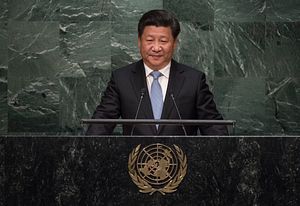The annual round of summitry is imminent. November is the time for the Asia Pacific Economic Cooperation forum (APEC), and the G20 summit that follows it. This year, the APEC meeting will be held in the Philippines, the G20 in Turkey. This will add two more countries to the list of 33 that Xi Jinping has visited since becoming president in 2013.
Much of the commentary and interest toward the APEC summit will revolve around discussions about the South and East China Seas. APEC involves almost all the main parties, from the United States to Vietnam, China, Japan, Indonesia, South Korea, and Malaysia. The fact that it is occurring in the Philippines adds to the piquancy. Memories are still fresh about Manila’s victory in late October in getting the Permanent Court of Arbitration in The Hague to grant a hearing to their maritime complaints, something China had opposed.
Signs of compromise or any hardening of positions among the contesting parties will be important, particularly in view of the United States’ more muscular attitude recently and its deployment of a destroyer in the region to protect rights of navigation. Even so, these disputes obscure a bigger issue, and one that the non-Chinese attending might want to ponder: what to make of the increasingly ambitious foreign policy posture of the Xi leadership and the opportunities – rather than threats – if offers them.
Over the last 18 months, we have seen increasing signs of Xi taking risks with Chinese diplomacy in ways his immediate predecessor never did. This is, after all, the leader who told the Australian parliament in November last year that he wished to see more vision and imagination in bilateral relations. It appears this was not just rhetoric, and didn’t just apply to Australia. This year, the Chinese-inspired Asian Infrastructure Investment Bank has moved from the planning board to something approaching institutional reality. Xi pursued climate change accords with the United States when visiting there in September. He crowned all of this off with the summit held with Taiwan’s Ma Ying-jeou. The remarkable effusiveness he showed when going to Britain in October adds to this sense that for Xi, the world is full of possibilities for China that are worth reaching out for.
One response to this ambition might be to see it as part of some grand strategy by China to annex more symbolic territory, assert its strategic space, and push for the United States to move back so that China can become even more like a superpower-in-waiting. This is the narrative we hear from some of the candidates in the Republican Party during the early stages of campaigning for the U.S. presidential elections. This interpretation has simplicity on its side, and fits neatly into the notion of a China threat.
But there is another way of interpreting China’s foreign policy boldness under Xi. It shows that he, and the leadership around him, does have the appetite to take risks. And there are some areas where China taking sensible risks is in the outside world’s interests, rather than signs of Chinese hubris and desire for a new kind of dominance. More practically, at least for international affairs, Xi has a great deal of prominence, and probably a lot of power within China. We are looking at a man who not only looks like he wants to do deals on formerly entrenched foreign affairs issues but probably can.
In the decade while Hu Jintao was China’s top leader, there was no real sense that he had much interest, or saw major benefits, in taking any real risks with foreign affairs issues. Entry to the World Trade Organization and gaining the Olympics were both achieved in the Jiang Zemin-era, even though their impact of course was apparent when Hu was in charge. Now, though, China has a leader who seems to want a larger role on the global stage, and sees real benefits from this. Xi thinks globally; there was little evidence Hu ever did. That surely is a big diplomatic opportunity.
If this interpretation is right, then the onus is now on the outside world to figure out how they can engage with Xi’s ambition in ways that work out well for them. The contesting parties in the South China Sea, for instance, might see a window of opportunity where they have a Chinese leader in foreign affairs strong enough to be able to hammer out a pragmatic deal. The main challenge is that the other claimants have to work together to come up with some resolution they can offer China rather than crying out about its assertiveness and bullying. So far, this has proved a hard task, but perhaps the United States can pressure them here.
In any case, this opportunity won’t be there forever. Xi has been asking for imagination and vision, and at the moment the chance is there for the outside world to supply some in response. If the meeting with Taiwan’s leader proved only one thing, it’s that with Xi in charge, we should be expecting surprises in foreign affairs. We may as well do all we can to make sure that these surprises have good rather than bad outcomes. The world should engage with Xi’s visions and try to find a way to shape and direct his ambition, rather than feeling threatened by it and pushing it, and the chances it gives the world, away.

































